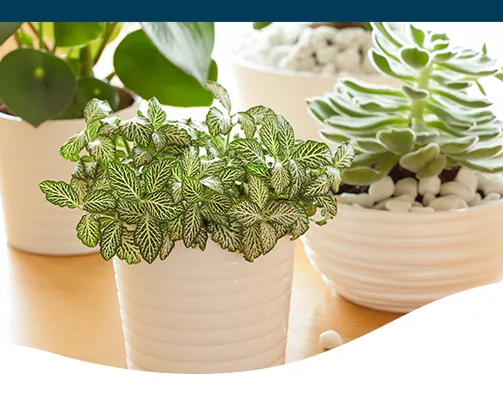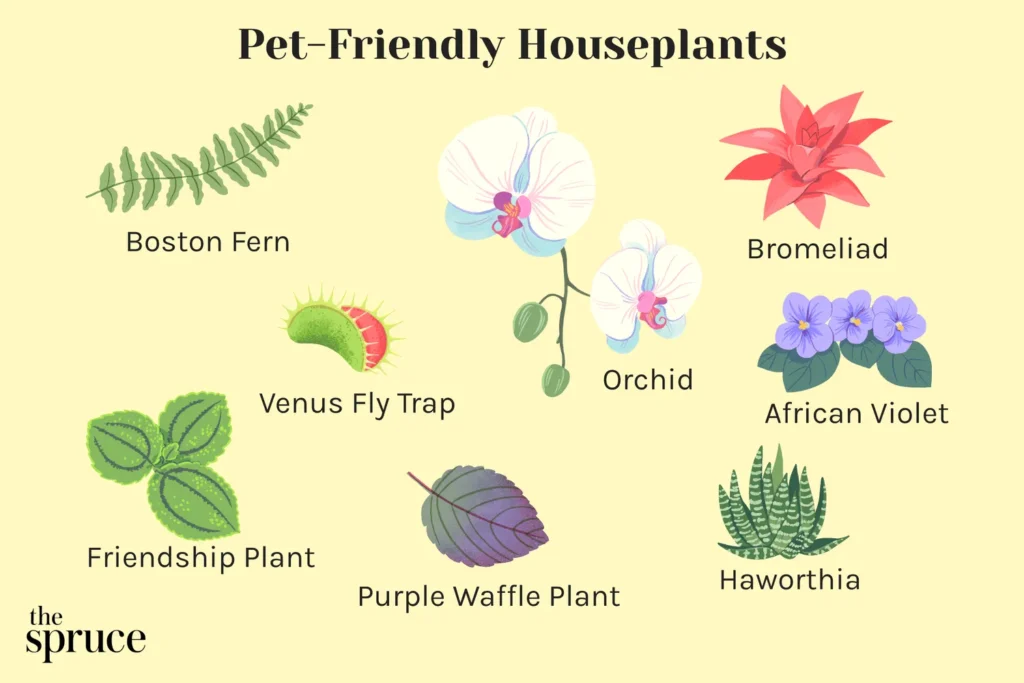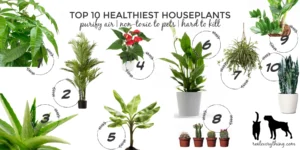Breathe easy! These 20 non-toxic houseplants that are safe for kids & pets, adding beauty and life without worry.
Introduction: 20 Non-Toxic Houseplants That Are Safe for Kids & Pets
Adding greenery to our homes lifts our spirits. But as a parent or pet owner, you know the constant worry: is this plant safe? Some popular houseplants contain toxins that can harm curious toddlers or playful pets.
The good news is that there are plenty of stunning, pet-friendly houseplants! They let you enjoy the beauty of nature without the stress of potential accidents.
The Importance of Non-Toxic Houseplants
When it comes to houseplants, it’s crucial to choose varieties that are non-toxic to ensure the safety of our children and pets. Some plants can cause skin irritation, allergic reactions, or even be toxic if ingested. By selecting non-toxic plants, we can enjoy the benefits of having plants in our home without worrying about the potential risks.
The Risks of Toxic Houseplants
Toxic houseplants can pose serious health risks to our children and pets. Some plants contain toxic compounds that can cause:
- Skin irritation and allergic reactions
- Respiratory problems
- Gastrointestinal issues
- Neurological problems
- Even death in severe cases
The Benefits of Non-Toxic Houseplants
Non-toxic houseplants offer numerous benefits, including:
- Air purification: Many plants are natural air purifiers, removing pollutants and toxins from the air
- Aesthetic appeal: Houseplants can add a touch of greenery and beauty to our spaces
- Stress relief: Studies have shown that being around plants can reduce stress and anxiety
- Improved mental health: Houseplants can have a positive impact on our mental health and well-being
Why Choose Non-Toxic Houseplants
- Peace of Mind: Relax knowing a playful nibble won’t result in tummy troubles or a trip to the vet.
- Kid-Friendly Gardening: Involve your little ones in plant care without fear.
- Pet-Safe Environment: Less stress knowing your furry friends can roam freely.
20 Non-Toxic Houseplants That Are Safe for Kids & Pets
Here are 20 non-toxic houseplants that are safe for kids and pets:
1. Spider Plant (Chlorophytum comosum)
- Easy to care for and propagate
- Air-purifying properties
- Can be grown in a variety of lighting conditions
2. Pothos (Epipremnum aureum)
- Low-maintenance and adaptable
- Can thrive in a range of lighting conditions
- Air-purifying properties
3. ZZ Plant (Zamioculcas zamiifolia)
- Low-maintenance and forgiving
- Can tolerate low light and infrequent watering
- Air-purifying properties
4. Snake Plant (Sansevieria Trifasciata)
- Known for its air-purifying properties
- Can thrive in low-light conditions
- Low-maintenance and easy to care for
5. Peace Lily (Spathiphyllum wallisii)
- Known for its beautiful white blooms
- Can thrive in low-light conditions
- Air-purifying properties
6. Dracaena (Dracaena spp.)
- Can grow up to 10 feet tall
- Can thrive in low-light conditions
- Air-purifying properties
7. Philodendron (Philodendron spp.)
- Can grow up to 5 feet tall
- Can thrive in a variety of lighting conditions
- Air-purifying properties
8. Parlor Palm (Chamaedorea elegans)
- Can grow up to 6 feet tall
- Can thrive in low-light conditions
- Air-purifying properties
9. Bamboo Palm (Chamaedorea seifrizii)
- Can grow up to 12 feet tall
- Can thrive in low-light conditions
- Air-purifying properties
10. Rubber Plant (Ficus elastica)
- Can grow up to 8 feet tall
- Can thrive in low-light conditions
- Air-purifying properties
11. Aloe Vera (Aloe barbadensis)
- Known for its healing properties
- Can thrive in low-light conditions
- Low-maintenance and easy to care for
12. Succulents (e.g., Aloe, Echeveria, Crassula)
- Low-maintenance and easy to care for
- Can thrive in low-light conditions
- Air-purifying properties
13. Peperomia (Peperomia spp.)
- Can thrive in low-light conditions
- Low-maintenance and easy to care for
- Air-purifying properties
14. Chinese Evergreen (Aglaonema spp.)
- Can thrive in low-light conditions
- Low-maintenance and easy to care for
- Air-purifying properties
15. Dumb Cane (Dieffenbachia seguine)
- Can thrive in low-light conditions
- Low-maintenance and easy to care for
- Air-purifying properties
16. Corn Plant (Dracaena fragrans)
- Can thrive in low-light conditions
- Low-maintenance and easy to care for
- Air-purifying properties
17. Boston Fern (Nephrolepis exaltata)
- Can thrive in low-light conditions
- Low-maintenance and easy to care for
- Air-purifying properties
18. English Ivy (Hedera helix)
- Can thrive in low-light conditions
- Low-maintenance and easy to care for
- Air-purifying properties
19. Wandering Jew (Tradescantia fluminensis)
- Can thrive in low-light conditions
- Low-maintenance and easy to care for
- Air-purifying properties
20. Prayer Plant (Maranta leuconeura)
- Can thrive in low-light conditions
- Low-maintenance and easy to care for
- Air-purifying properties
What are some non-toxic houseplants that are safe for kids and pets?

Based on the search results provided, here are some non-toxic houseplants that are safe for kids and pets:
- Air Plants (Tillandsia)
- Baby’s Tears (Soleirolia soleirolii)
- Bamboo Palm (Chamaedorea seifrizii)
- Bromeliads
- Chinese Evergreen (Aglaonema modestum)
- Christmas Cactus (Schlumbergera bridgesii)
- Daisy (Bellis perennis)
- Dracaena (Dracaena spp.)
- English Ivy (Hedera helix)
- Geranium (Pelargonium spp.)
- Hibiscus (Hibiscus spp.)
- Holly Fern (Cyrtomium falcatum)
- Jade Plant (Crassula ovata)
- Lilyturf (Liriope spp.)
- Pothos (Epipremnum aureum)
- Prayer Plant (Maranta leuconeura)
- Peace Lily (Spathiphyllum wallisii)
- Philodendron (Philodendron spp.)
- Pineapple Plant (Ananas comosus)
- Rubber Plant (Ficus elastica)
- Snake Plant (Sansevieria Trifasciata)
- Spider Plant (Chlorophytum comosum)
- Sweet Alyssum (Lobularia maritima)
- Wandering Jew (Tradescantia fluminensis)
- Wax Plant (Hoya spp.)
The search results provide a comprehensive list of non-toxic houseplants that are safe for kids and pets, including details on their care requirements and benefits. These plants can be a great addition to any home with young children or furry friends.
How to choose the right houseplants for your home?
To choose the right houseplants for your home, consider the following factors based on the information from the provided sources:
- Safety: Ensure the plants are non-toxic, especially if you have children or pets. Research the toxicity of plants before bringing them into your home to prevent any health issues.
- Placement: Place toxic plants out of reach of children and pets, using hanging baskets, high shelves, or careful supervision. Consider the accessibility of the plants to curious fingers and mouths.
- Lighting and Humidity: Understand the lighting conditions in your home and choose plants that thrive in those conditions. Some plants prefer direct sunlight, while others do well in indirect light. Additionally, consider the humidity levels required by different plants.
- Maintenance: Select plants that match your ability to care for them. If you are not home regularly, opt for low-maintenance plants. Consider how much time and effort you can dedicate to plant care.
- Personal Preference: Involve your family in the selection process. Let your children choose plants they like, but ensure they are safe for kids and pets. Consider the aesthetic appeal of the plants and how they fit into your home decor.
By considering these factors, you can choose houseplants that are safe, suitable for your home environment, and easy to maintain, ensuring a beautiful and safe indoor space for your family.
What are the benefits of having houseplants in your home?

Based on the information provided in the search results, the key benefits of having houseplants in your home are:
- Improved Air Quality:
- Houseplants can remove harmful air pollutants like formaldehyde, benzene, and trichloroethylene from the air.
- Plants release oxygen and absorb carbon dioxide, improving the air quality.
- The soil and microorganisms in potted plants also help clean indoor air.
- Stress Reduction and Improved Well-Being:
- Caring for and interacting with houseplants can reduce psychological and physiological stress.
- Exposure to indoor plants can improve feelings of well-being and reduce symptoms of anxiety and depression.
- Cognitive Benefits:
- Houseplants can help people recover from mental fatigue and improve focus and memory.
- Studies have shown that working or studying in the presence of plants can increase productivity and quality of work.
- Aesthetic and Mood Benefits:
- Houseplants add beauty, interest, and a connection to nature in an indoor environment.
- The presence of plants can generate happiness and a sense of well-being.
- Humidity Regulation:
- Houseplants release moisture through transpiration, which can help increase humidity in dry indoor environments.
Overall, the search results indicate that incorporating non-toxic houseplants into your home can provide a range of physical, mental, and emotional benefits for you and your family.
Conclusion:
Incorporating non-toxic houseplants into your home can be a great way to create a safe and healthy environment for your family. By choosing from the 20 non-toxic houseplants listed above, you can enjoy the benefits of houseplants while keeping your kids and pets safe. Remember to always double-check the toxicity of any plant before bringing it into your home, and happy planting!
FAQs:
A: No, many houseplants can be toxic to kids and pets. It’s essential to research the toxicity of any plant before bringing it into your home.
A: Caring for non-toxic houseplants is similar to caring for any other houseplant. Make sure to water, fertilize, and prune them regularly.
A: Yes, many houseplants are known for their air-purifying properties. By choosing non-toxic houseplants, you can enjoy the benefits of air purification while keeping your family safe.
